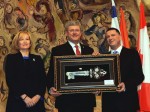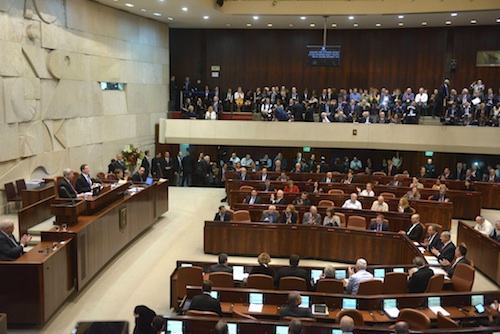Images and symbolism mean a great deal in politics. This was presumably on the mind of Conservative Member of Parliament Mark Adler last week, when he hounded an aide to Prime Minister Stephen Harper to let him into the cordoned-off area adjacent to Jerusalem’s Western Wall, where Harper was to be photographed having a quiet moment of reflection against Judaism’s holiest site.
Adler, who later claimed he was making a joke, asked Harper’s handler to let him get a photo with the prime minister at the Wall, saying, “This, it’s the reelection. This is the million-dollar shot.”
Assuming that not everything Adler said was in jest, he was not speaking about the Conservative party’s reelection as government, but his own reelection in a swing riding with a large Jewish population (Toronto York Centre). The incident was particularly harmful – joke or no joke – because it seemed to confirm what many critics have posited about the prime minister’s visit.
Harper and his supporters maintain emphatically that the prime minister and his government’s stalwart allegiance to Israel is based on principle. Adler’s outburst appeared to be evidence that the most cynical political calculations were at play, at least for some members of the tour. Regardless, it is probably safe to say that, after nearly eight years of Harper’s prime ministership, any Jewish Canadian who is going to be influenced to vote Conservative based on Harper’s foreign policy has already been won over.
Meanwhile, Israeli Prime Minister Binyamin Netanyahu’s words early this week also sent people into a tizzy. Netanyahu appeared to moot the idea that, when a two-state resolution is realized, the Jews living in the West Bank should have the option of becoming citizens of the new Palestinian state.
Netanyahu’s intention, perhaps, was to draw global attention to the hypocrisy of accepted wisdom that Israel should be a multicultural society that respects minorities and that Israel should negotiate a “right of return” for Palestinians, while a “free” Palestine should be free of Jews. Realistically, of course, the idea of Jewish residents opting to remain in a new Palestinian state holds the potential for both comedy and tragedy. Not for nothing have Jews almost to a number fled every Arab-majority state in the region. Most settlers would not look fondly at their options under Palestinian rule. In fact, if Netanyahu’s trial balloon was meant to get a reaction from the world community, the sharpest response was from closer to home. His own cabinet minister, Naftali Bennett, responded with a single word: “Never.”
In any negotiation, wise participants put forward proposals that the other side is certain to reject, sometimes in an effort at appearing to compromise, sometimes to expose the other side’s pretense. Netanyahu’s latest gambit appears to be along these lines. But the Palestinians have demonstrated no willingness to entertain the idea of giving Jewish people citizenship in their new country. And the world community, for whom the words may have been expressed in the first place, will likely be unswayed.
However, Netanyahu’s own right flank appears to view his comments as the abandonment of the Jews of the West Bank. In the aftermath of the resulting backlash, one can almost imagine him taking a cue from Adler, who, after the incident at the Wall, confronted the reporters who conveyed the incident to voters back home: “You guys don’t get a joke, huh? It’s all said tongue-in-cheek. Tongue-in-cheek, guys, come on.”



